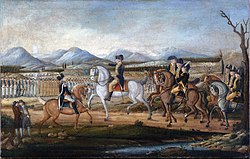
Back تمرد الويسكي Arabic ویسکی عوصیانی AZB Паўстанне з-за віскі Byelorussian Whisková rebelie Czech Whiskey-Rebellion German Viskia Ribelo Esperanto Rebelión del whiskey Spanish شورش ویسکی Persian Viskikapina Finnish Révolte du Whisky French
| Whiskey Rebellion | |||||||
|---|---|---|---|---|---|---|---|
 George Washington reviews the troops near Fort Cumberland, Maryland, before their march to suppress the Whiskey Rebellion in western Pennsylvania. | |||||||
| |||||||
| Belligerents | |||||||
|
| Frontier tax protesters | ||||||
| Commanders and leaders | |||||||
|
George Washington Alexander Hamilton Henry Lee III Thomas Sim Lee | James McFarlane † | ||||||
| Units involved | |||||||
| State militia from: | Rebels | ||||||
| Strength | |||||||
|
13,000 Virginia, Maryland, New Jersey and Pennsylvania militia 10 regular army troops | 600 Pennsylvania rebels | ||||||
| Casualties and losses | |||||||
| None; about 12 died from illness or in accidents[1] |
3–4 killed 150 captured | ||||||
| 2 civilian casualties | |||||||
The Whiskey Rebellion (also known as the Whiskey Insurrection) was a violent tax protest in the United States beginning in 1791 and ending in 1794 during the presidency of George Washington. The so-called "whiskey tax" was the first tax imposed on a domestic product by the newly formed federal government. The "whiskey tax" became law in 1791, and was intended to generate revenue to pay the war debt incurred during the Revolutionary War. Farmers of the western frontier were accustomed to distilling their surplus rye, barley, wheat, corn, or fermented grain mixtures to make whiskey. These farmers resisted the tax.
Throughout western Pennsylvania counties, protesters used violence and intimidation to prevent federal officials from collecting the tax. Resistance came to a climax in July 1794, when a US marshal arrived in western Pennsylvania to serve writs to distillers who had not paid the excise. The alarm was raised, and more than 500 armed men attacked the fortified home of tax inspector John Neville. Washington responded by sending peace commissioners to western Pennsylvania to negotiate with the rebels, while at the same time calling on governors to send a militia force to enforce the tax. Washington himself rode at the head of an army to suppress the insurgency, with 13,000 militiamen provided by the governors of Virginia, Maryland, New Jersey, and Pennsylvania. The leaders of the rebels all fled before the arrival of the army, and there was no confrontation. About 150 men were arrested, but only 20 held for trial in Philadelphia, and only two were convicted (eventually pardoned).
The Whiskey Rebellion demonstrated that the new national government had the will and ability to suppress violent resistance to its laws, though the whiskey excise remained difficult to collect. The events contributed to the formation of political parties in the United States, a process already under way. The whiskey tax was repealed in the early 1800s during the Jefferson administration.
- ^ Robert W. Coakley, The Role of Federal Military Forces in Domestic Disorders, 1789–1878 (DIANE Publishing, 1996), 67.